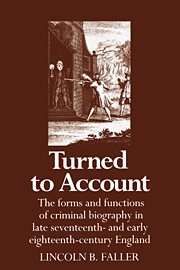 Turned to Account
Turned to Account Book contents
- Frontmatter
- Contents
- Preface
- Part I Turning criminals to account: three case histories and two myths of crime
- Part II Enucleating the truth: the criminal as sinner turned saint
- Part III Palliating his crimes: the thief as various rogues
- Postscript: Criminal biography and the novel
- Appendix I Who read the popular literature of crime?
- Appendix II The politics of thieving
- Notes
- Select bibliography
- Index
- Frontmatter
- Contents
- Preface
- Part I Turning criminals to account: three case histories and two myths of crime
- Part II Enucleating the truth: the criminal as sinner turned saint
- Part III Palliating his crimes: the thief as various rogues
- Postscript: Criminal biography and the novel
- Appendix I Who read the popular literature of crime?
- Appendix II The politics of thieving
- Notes
- Select bibliography
- Index
Summary
The Attention of the Publick is naturally excited towards those, who, by violating the Laws of their Country, are become liable to Punishment… [N]ot only the Crime, but the Connexions and most private History of the unfortunate Delinquents, are eagerly enquired into, and become the Subjects of every Conversation. To be ignorant of, or to have nothing new to offer upon these Topicks, almost excludes us from Society…. Hence, too commonly, numberless Falsehoods are invented, every Particular that comes to our Knowledge exaggerated, by the various Hands through which it passes. Hence also arise the different Representations, which are made both of their Offence and Character: Some esteeming them proper Subjects for Raillery, draw, as it were, a pleasing Picture of a Hero in Iniquity … others [magnify] each little Error and Frailty.
Memoirs of Darkin (1761), p. [3]As Necessity compels us, for the Preservation of our Lives, to feed upon Herbs and Roots, for want of Bread, in like manner, when the Knowledge of Truth, which is the proper and natural Food of the Mind, is wanting, we support it with Fiction, which is in Imitation of the Truth.
Pierre Daniel Huet, “Upon the Original of Romances,” in [Samuel Croxall], ed., A Select Collection of Novels (1722), i:xliii.More often than not, stylistics… ignores the social life of discourse outside the artist's study, discourse in the open spaces of public squares, streets, cities and villages, of social groups, generations and epochs.
M. M. Bakhtin, “Discourse in the Novel,” in The Dialogic Imagination, ed. Michael Holquist, tr. Caryl Emerson and Holquist, p. 259- Type
- Chapter
- Information
- Turned to AccountThe Forms and Functions of Criminal Biography in Late Seventeenth- and Early Eighteenth-Century England, pp. ix - xivPublisher: Cambridge University PressPrint publication year: 1987
